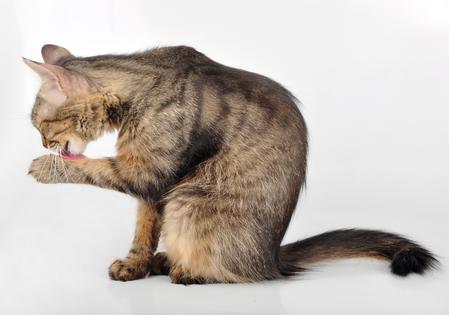My Pet World: Helping kittens who never learned to groom themselves
Dear Cathy,
I have two adult cats and recently adopted two long-haired sibling kittens, who are about 11 months old. The adult cats want nothing to do with the kittens. The kittens were raised by a foster mom and refused to be held or cuddled. Is there anything we can do to help this? They also appear to never have been taught to clean themselves when they were with their mom. They will leave the box with poop down their legs and stuck to their backside. How can I teach them to clean themselves? One is a girl, and the other is a boy.
— Carol, Long Island, New York
Dear Carol,
Kittens who lose their mothers sometimes don't learn to groom themselves adequately. You can teach them better hygiene by wiping them down daily with a feline cleansing wipe. Using your pointer and middle finger, use the wipe to stroke your kitten's coat similarly to a mother cat's tongue. (Watch videos on cats cleaning their kittens and try to mimic it.) If the kittens are uncooperative, have someone scruff their neck to keep them still. They will lick themselves afterward, which will, in turn, teach them how to groom themselves.
As for the poop down their legs, their stool sounds too soft, which can be the result of a health problem or their diet. Rule out any health problems first, then address the diet. I assume you're feeding them wet food for this to happen, so reduce their wet food intake and gradually pair it with dry food. If this doesn't work, wean them off wet food entirely and feed them dry food for a period of time to see if that helps.
Dear Cathy,
I have a 14-year-old Shih-Tzu mix with mild heart issues. The vet wants to do a dental cleaning. I’m nervous about putting her under anesthesia and just generally putting her through this. I’ve had dogs my whole life but never have done a dental. How necessary is this to a dog this age?
— Katherine, Tulsa, Oklahoma
Dear Katherine,
It’s hard to know how long your Shih-Tzu will live, but probably a few more years, depending on her health. Poor dental hygiene cannot only result in the loss of her teeth, but lead to heart problems – or, in your case, more heart problems. So, if her teeth are bad, it’s probably a good idea to have the procedure done.
But I understand your worry. She’s an older dog with heart problems and you are concerned she may not be healthy enough to undergo anesthesia. Your vet will likely recommend a senior blood panel before surgery. When there are heart problems, they should also recommend a consultation with a cardiac specialist for more tests prior to surgery. A cardiac specialist can help you decide if she is healthy enough for surgery. If she is, they can make recommendations for her anesthesia cocktail to ensure the procedure is safe for her.
Dear Cathy,
For almost 40 years, I have used a potty training method that includes telling my dogs to "go potty." However, instead of using clickers or saying good dog, etc., I tell them, "good potty." That way, they associate the praise with the action. In fact, when they poop, I tell them, "good poopie," so they also learn the difference between "peeing" and "pooping." I do this for any training: good sit, good stay, etc., associating the praise with the action.
— Pat, Wittman, Maryland
Dear Pat,
You're using a marker word to mark the desired behavior with the word "good," indicating approval, and an obedience command indicating the desired action. This is a terrific way to train your dogs. You can use this “marker phrase” as a command (and not just approval) when you need your dogs to do something, like relieve themselves when you're in a hurry.
Increasing your dog's vocabulary through training also helps him use his brain and makes him smarter. On average, dogs can learn about 100 words, regardless of the language. Training creates a closer bond between pet and owner, which increases understanding on both sides.
Thanks for sharing your experience.
Pet Tip: It's been a sweltering summer so far. Please protect your pet from the heat and learn the signs of heat exhaustion, which include heavy panting, dry and abnormal gum color, rapid pulse, disorientation, lethargy, vomiting, and collapsing. If you're pet exhibits any of these symptoms, offer them cool water (not cold) and place cool, wet towels across their body. Then contact your veterinarian immediately for emergency care.
========
(Cathy M. Rosenthal is a longtime animal advocate, author, columnist and pet expert who has more than 25 years in the animal welfare field. Send your pet questions, stories and tips to cathy@petpundit.com. Please include your name, city, and state. You can follow her @cathymrosenthal.)
©2022 Tribune Content Agency, LLC.
(c) 2022 DISTRIBUTED BY TRIBUNE MEDIA SERVICES, INC.










